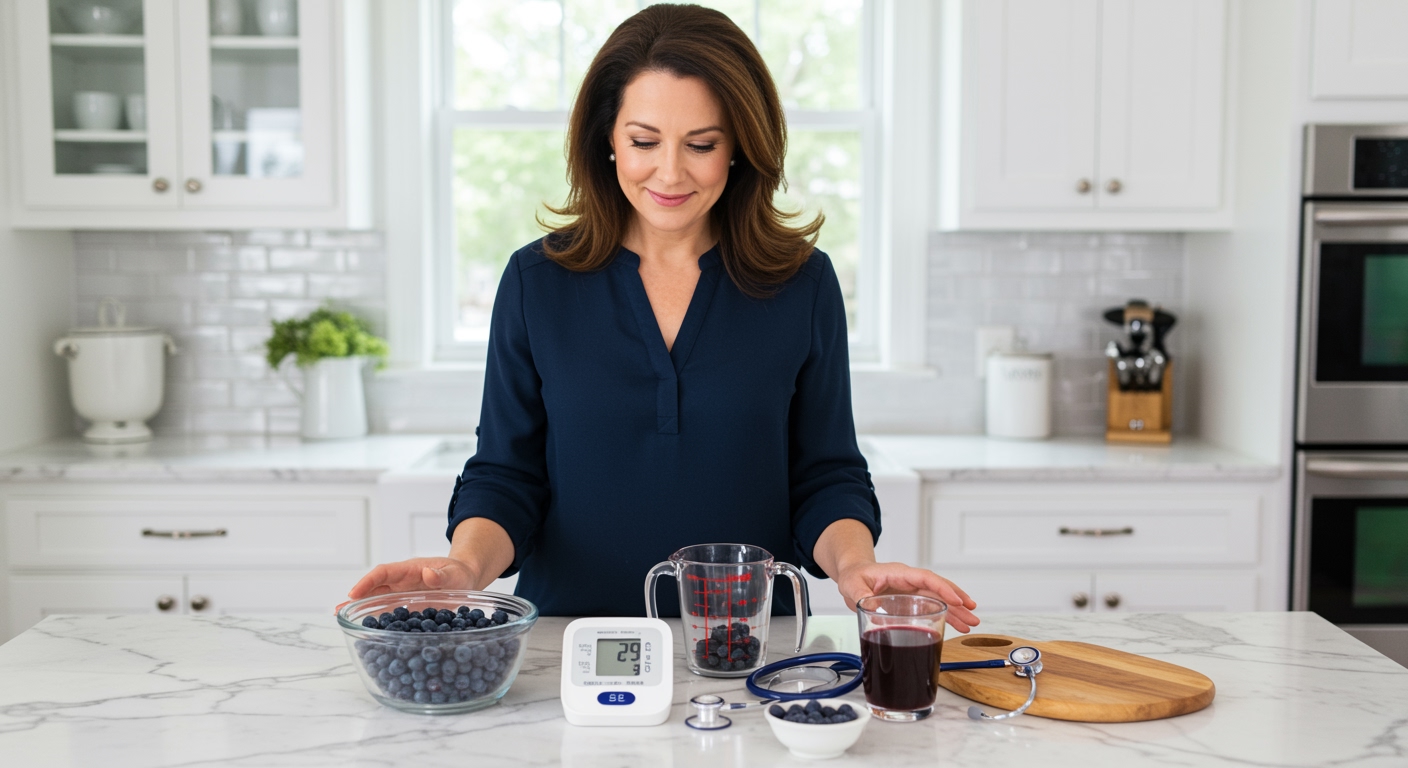✪ Key Takeaway: Blueberries can modestly lower blood pressure through anthocyanins, but effects vary and require consistent daily intake.
Introduction
Your doctor mentions diet changes for blood pressure, and suddenly everyone is talking about blueberries.
You might be wondering if these tiny fruits really pack enough power to make a difference in your cardiovascular health, or if this is just another health trend that sounds too good to be true.
Hi, I am Abdur, your nutrition coach, and today I am going to explain exactly what science tells us about blueberries and blood pressure, so you can make informed decisions about your health.
What Makes Blueberries Special For Blood Pressure?
Blueberries contain powerful compounds called anthocyanins that give them their deep blue color.
These anthocyanins work by improving the function of your endothelium, which is the inner lining of your blood vessels.
When your endothelium functions better, it produces more nitric oxide, a molecule that helps your blood vessels relax and widen.
This relaxation reduces the pressure your heart needs to pump blood through your system.
Research shows that people who eat blueberries regularly have measurably better arterial flexibility compared to those who do not.
The anthocyanins also reduce inflammation in your blood vessels, which can contribute to high blood pressure over time.
✪ Fact: One cup of blueberries contains about 84 milligrams of anthocyanins, which is considered a therapeutic dose.
How Much Do Blueberries Actually Lower Blood Pressure?
Clinical studies show that eating blueberries can reduce systolic blood pressure by 4 to 6 mmHg on average.
This might not sound like much, but even small reductions in blood pressure can significantly lower your risk of heart disease and stroke.
The effects typically become noticeable after 8 to 12 weeks of consistent daily consumption.
Most successful studies used between 1 to 2 cups of fresh blueberries daily, or the equivalent in freeze-dried powder.
People with mild to moderate hypertension tend to see better results than those with severely elevated blood pressure.
The blood pressure lowering effect appears to be dose-dependent, meaning more blueberries generally produce greater benefits up to a certain point.
However, eating more than 2 cups daily does not seem to provide additional cardiovascular benefits.
✪ Pro Tip: Frozen blueberries retain nearly all their anthocyanin content and are often more affordable than fresh ones.
Do All Blueberries Work The Same Way?
Wild blueberries contain significantly more anthocyanins than cultivated varieties you find in most grocery stores.
The smaller size of wild blueberries means they have more skin relative to their flesh, and the skin contains the highest concentration of beneficial compounds.
Fresh and frozen blueberries provide similar health benefits, but dried blueberries often contain added sugars that can counteract some cardiovascular benefits.
Blueberry juice can be effective, but whole berries provide additional fiber that helps slow sugar absorption and provides extra heart benefits.
The processing method matters significantly for supplements and powders.
Freeze-dried blueberry powder retains most of the original nutritional value, while heat-processed products may lose some potency.
Organic blueberries do not necessarily contain more anthocyanins than conventional ones, but they avoid pesticide residues that some people prefer to limit.
✪ Note: Blueberry supplements are not regulated like medications, so quality and potency can vary significantly between brands.
What Can Block Blueberry Benefits?
Consuming blueberries with dairy products like yogurt or milk can reduce their blood pressure benefits.
The proteins in dairy bind to anthocyanins, making them less available for your body to absorb and use.
High-fat meals can also interfere with anthocyanin absorption, so timing your blueberry consumption matters.
Certain medications, particularly blood thinners, may interact with high doses of blueberries due to their natural anticoagulant properties.
Smoking significantly reduces the cardiovascular benefits of blueberries by increasing oxidative stress in your blood vessels.
Excessive alcohol consumption can also counteract the anti-inflammatory effects that make blueberries beneficial for blood pressure.
People with certain digestive conditions may not absorb anthocyanins as effectively, reducing the potential benefits.
✪ Pro Tip: Eat blueberries on an empty stomach or with plant-based foods to maximize their blood pressure benefits.
Should You Rely On Blueberries Alone?
Blueberries work best as part of a comprehensive approach to blood pressure management, not as a standalone solution.
The most effective dietary pattern for blood pressure includes blueberries alongside other antioxidant-rich foods like leafy greens, nuts, and fatty fish.
Reducing sodium intake and increasing potassium-rich foods will amplify the benefits you get from blueberries.
Regular physical activity enhances the cardiovascular benefits of blueberries by improving overall endothelial function.
Stress management techniques like meditation or deep breathing can work synergistically with the anti-inflammatory effects of blueberries.
If you have high blood pressure, continue taking prescribed medications while adding blueberries to your diet.
Monitor your blood pressure regularly and work with your healthcare provider to adjust treatments as your cardiovascular health improves.
✪ Note: Never stop taking blood pressure medications without consulting your doctor, even if your numbers improve with dietary changes.
The Bottom Line
Blueberries can indeed help lower blood pressure through their anthocyanin content, but the effects are modest and require consistent daily consumption over several months.
Small changes in your daily food choices can create significant improvements in your long-term health outcomes.
I would love to hear about your experience with blueberries or any questions you have about using food as medicine for blood pressure management in the comments below.
References
At NutritionCrown, we use quality and credible sources to ensure our content is accurate and trustworthy. Below are the sources referenced in creating this article:
- Harvard Health: Blueberries may help lower blood pressure
- PubMed: Effects of blueberry consumption on cardiovascular risk factors
- PMC: Blueberry anthocyanins and cardiovascular health
- Frontiers in Nutrition: Blueberry consumption and blood pressure regulation
- NutritionFacts: Benefits of blueberries for blood pressure may be blocked by yogurt





